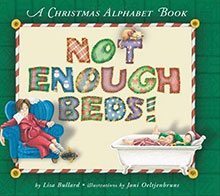 After my first book was published, one of my friends gave me a knowing look and said, “I’ve figured out exactly what your story means.”
After my first book was published, one of my friends gave me a knowing look and said, “I’ve figured out exactly what your story means.”
 I nodded wisely, two of us in on the same secret together, but truthfully? I was eager to hear what she had to say. Because in all the time I’d spent writing, revising, and talking about the book to other people, it had honestly never occurred to me to ask myself what the story meant. In my mind, Not Enough Beds! was a simple tale about too many relatives showing up for Christmas Eve, and the funny places everybody finds to sleep when it turns out that — wait for it — there are not enough beds. I thought it was a funny family alphabet book, not a commentary on the human condition.
I nodded wisely, two of us in on the same secret together, but truthfully? I was eager to hear what she had to say. Because in all the time I’d spent writing, revising, and talking about the book to other people, it had honestly never occurred to me to ask myself what the story meant. In my mind, Not Enough Beds! was a simple tale about too many relatives showing up for Christmas Eve, and the funny places everybody finds to sleep when it turns out that — wait for it — there are not enough beds. I thought it was a funny family alphabet book, not a commentary on the human condition.
Which just goes to show how much writers know about their own work! Apparently, as my friend explained, the 224 words of my story are actually a moving testament to the fact that we’re all just going through life looking for where we belong in the world, and family are the people who make a place for us no matter what.
Usually in my pieces here I talk about things that you can suggest to young writers to give them an entrée point to more powerful writing. This week, I’m suggesting something that you might want to avoid suggesting: don’t put too much emphasis on what their writing means. Do we really have to dissect the “enigmatic smile” of the Mona Lisa? Some writers may have a clear intention for their meaning as they write; but just as often, based on the writers I know, that isn’t the case. In fact, my friend and poet Laura Purdie Salas talks about just that in a guest blog.

Thanks for reminding me of that post, Lisa! I’m thinking now that maybe it’s a good thing we don’t know the big WHAT we’re writing about when we write. That would be so intimidating! And even when I think I know the big WHAT, it morphs into some other WHAT as I write, anyway. A little mystery is a good thing:>)
Leaving room for “a little mystery” also allows for the reader to bring their own meaning to the piece – such a key part of the reading experience. I know that for you as a poet that’s something you build into all your work!